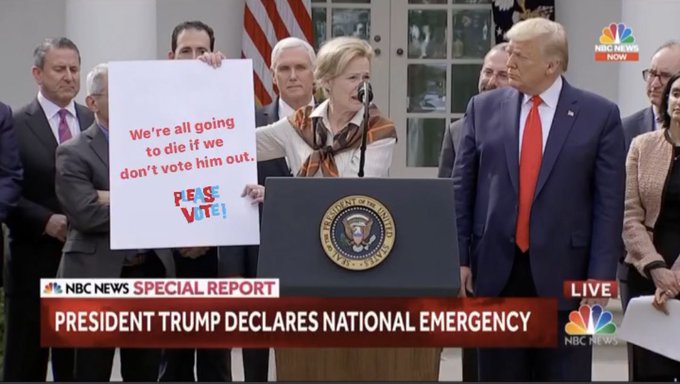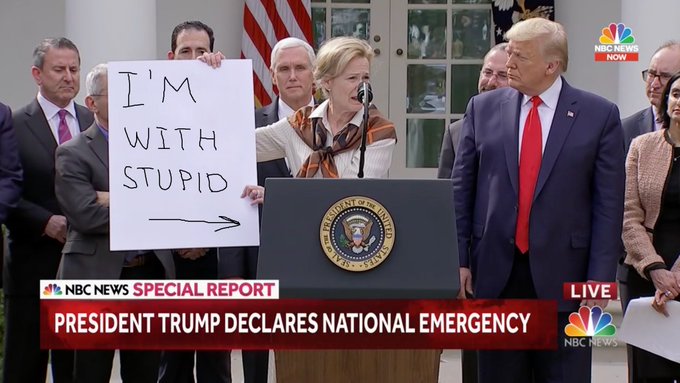Anyone surprised by this decision which contributed to where we are today-Unprepared.
Tearing down America's pandemic response infrastructure
In 2018, the Trump administration
ousted Rear Adm. Tim Ziemer, who served as the Senior Director of Global Health Security. Ziemer was a member of the National Security Council, where he was responsible for coordinating "responses to global health emergencies and
potential pandemics." Ziemer was lauded as "
one of the most quietly effective leaders in public health." His work on Malaria during the Obama administration helped save 6 million lives.
"Admiral Ziemer’s departure is deeply alarming," Congressman Ami Bera (D-CA) said in May 2018. "Expertise like his is critical in avoiding large outbreaks." Beth Cameron, who served on the National Security Council in the Obama administration, said that Ziemer's ouster was “a major loss for health security, biodefense, and pandemic preparedness” and noted that it "is unclear in his absence who at the White House would be in charge of a pandemic."
John Bolton, who was serving as Trump's National Security Adviser at the time, did not just remove Ziemer. He decided to eliminate the position, and "
the NSC’s entire global health security unit." Bolton also
forced out Tom Bossert, a highly regarded expert who was Ziemer's counterpart at the Department of Homeland Security. "Neither the NSC nor DHS epidemic teams have been replaced," Foreign Policy
reported in January.
Trump slashed funding for the CDC's epidemic prevention activities, forcing the agency to end its work "
in 39 out of 49 countries because money is running out" in 2018. The program, which started in 2014, was designed to "help countries prevent infectious-disease threats from becoming epidemics." Among the countries no longer included: China.
Trump has also tried to decimate funding for the U.S. Public Health Service Commissioned Corps, which is tasked with fighting the spread of disease. Congress, however, has refused to comply. So the Trump administration has simply let the group
slowly atrophy, failing to replace members who quit or retire.
Who is in charge?
Who is in charge of the United States' response to the coronavirus? You might assume it is the CDC. You would be wrong.
There were several hundred Americans aboard a cruise ship, the Diamond Princess, that experienced an outbreak of COVID-19 near Japan. The Americans were evacuated and, before they were flown home, 14 tested positive for the coronavirus. The CDC advised that these infected passengers should not be flown home with the rest of the group, arguing that
they could infect the others.
The CDC, however, was overruled by the "State Department and a top Trump administration health official." The decision was made even though to government "had already told passengers they would not be evacuated with anyone who was infected or who showed symptoms." CDC officials were so distraught that they "demanded to be left out of the news release that explained that infected people were being flown back to the United States."
At the moment, there is no "
clear chain of command for pandemic response."
Flunking the test
The number of confirmed COVID-19 cases in the United States, so far, is relatively low. But there are also
serious problems with the system set up to identify new outbreaks.
The test developed by the CDC to detect the coronavirus has not been able to be verified as accurate by most labs. As a result, just "three of the more than 100 public health labs across the country have verified the CDC test for use." This has "hampered CDC’s plan to screen samples collected by its national flu-surveillance network for the coronavirus." These issues "could impede the U.S. government’s ability to detect scattered cases before they snowball into larger outbreaks."
The CDC is now reformulating the test. The FDA, however, "would have to authorize any changes to the coronavirus test before the CDC could distribute a new one."
Politics over science
Inside the White House, the concern has been around how the coronavirus could impact Trump's reelection. Senior officials
fear "a sustained outbreak could slow global markets and upend a strong U.S. economy that has been central to Trump’s political pitch."
Trump has been
eager to downplay the threat of the coronavirus in public, recently expressing confidence that the virus would dissipate in a few weeks when the weather gets warmer.
Now, the virus that we’re talking about having to do — you know, a lot of people think that goes away in April with the heat — as the heat comes in. Typically, that will go away in April. We’re in great shape though. We have 12 cases — 11 cases, and many of them are in good shape now.
There is no scientific basis for Trump's claim, which is based on the assumption that the coronavirus will follow the same pattern as the seasonal flu. Columbia University epidemiologist Stephen Morse called Trump's comments "wishful thinking" and warned against being "lulled by hopeful, but quite possibly wrong analogies."
Trump's willingness to disregard science when it suits him is dangerous. Containing the coronavirus requires the government to base its policies on science and provide the public with accurate information. It also requires the public to trust the information it is receiving from government officials.
Trump, however, has spent three years undermining trust in all institutions. The result is an information environment that makes it more difficult to contain a potential outbreak.




